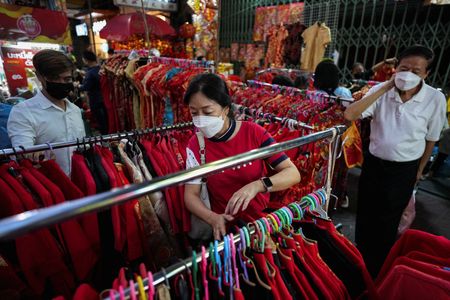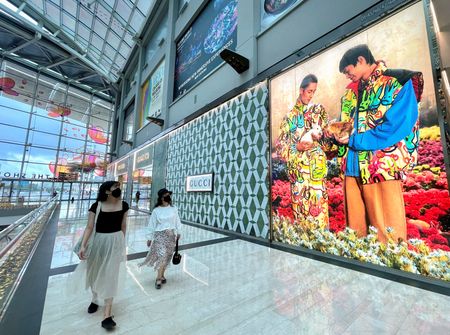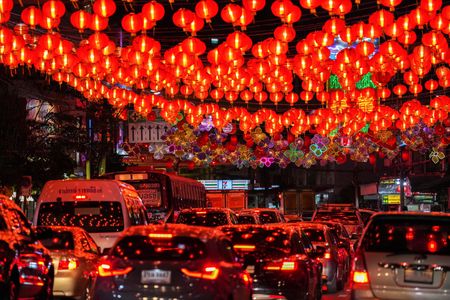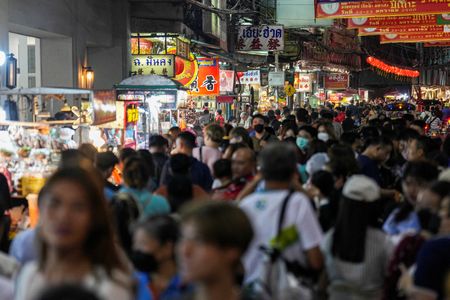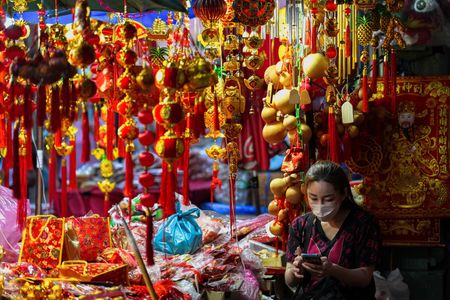By Chayut Setboonsarng and Farah Master
BANGKOK/HONG KONG (Reuters) – As Chinese shoppers trickle back to tourist hotspots for Lunar New Year holidays, malls from Macau to Bangkok aim to lure them into stores with red lantern displays, special dances to mark the Year of the Rabbit – and discounts.
The overall number of international flights from China is still just 12% of pre-pandemic levels due to slow capacity increases. But retailers in popular Asian destinations are desperate to take advantage of the return of a first wave of Chinese tourists as the country reopens borders after three long years of COVID-19 curbs.
That’s because Chinese customers have been a much-missed mainstay of the world’s retail and travel industry: Their spending on travel had grown to $255 billion in 2019, before the pandemic, and accounted for 33% of spending in the global luxury personal goods market, according to estimates from Bain.
“We’re definitely seeing an uptick in traffic across both the gaming and retail side of the business,” said a Macau casino executive, who was not able to be named due to company policy. “It’s extremely uplifting after three very sad years and has provided a morale boost to everyone within the resorts as well.”
Many resorts on the gaming hub’s Las Vegas-style strip have been sold out for the Lunar New Year period, hotel executives said.
The number of daily international flights from China topped 300 this week for the first time since May 2020, VariFlight data shows, reaching 310.
Shanghai-based Juneyao Airlines reported its flights to Thai resorts Chiang Mai and Phuket were 99% and 95% full respectively when it resumed regular operations this week. And robust demand for destinations like Macau, Hong Kong, Taiwan and Thailand has boosted prospects for the battered travel industry, Ctrip booking data shows.
DS Kim, an analyst at JPMorgan in Hong Kong, said the outlook for Lunar New Year in Macau was brighter than expected based on hotel availability, with a recovery to 50% of 2019 demand possible versus an earlier forecast of 35% to 40%.
EARLY DAYS
In Bangkok, upscale shopping mall Iconsiam, which houses outlet for luxury goods giants LVMH’s Louis Vuitton and Prada, is rolling out an “Eternal Prosperity” campaign for the Lunar New Year designed to drive up traffic by 10% to 15%, managing director Supoj Chaiwatsirikul said.
The campaign will include red lanterns, cash-back offers and a raffle for gold bars as well as a riverside rabbit dance, he said.
In Singapore, the upmarket mall at the Marina Bay Sands resort has put in place giant rabbit decorations.
Since December, the mall’s outlet for Kering’s Gucci store has seen an influx of Chinese tourists, now the second-biggest clients behind locals, according to a staff member who was not authorised to speak with media.
Still, destinations elsewhere show that the return of Chinese tourists remains at a very early stage. Fresh COVID testing requirements for Chinese tourists in some locations may be acting as a barrier, while some countries also require visas that take time to process.
Rinascente, an upmarket Italian department store operator owned by Thailand’s Central Retail Corp, is not planning to decorate shop windows with a Lunar New Year theme, unlike pre-pandemic practice, because there are still only a small number of Chinese visitors, Chief Financial Officer Mariella Elia said.
“We did it in the past and we’ll do it again next year,” she said of the celebratory displays.
Retailers in South Korea are also not seeing a huge influx in Chinese tourists yet, citing the suspension of short-term visas for travellers between both countries.
“Duty-free stores are focusing on promotions for Korean travellers … When the situation improves and tourism further catches on, we’ll expand packages for foreign travellers,” said an official at Shilla Duty Free.
In Hong Kong, which has seen a big increase in mainland visitors, retailers say that has yet to translate into a significant sales jump, with many people appearing to be coming largely to see families.
“Before the pandemic, about 60% of our daily customers were mainlanders. But … now there are only some mainland tourists coming occasionally,” said a manager at Lui Fook Jewellery.
(Reporting by Chayut Setboonsarng in Bangkok and Farah Master in Hong Kong; Additional reporting by Elisa Anzolin in Milan, Chen Lin in Singapore, Angel Wu in Hong Kong, Sophie Yu and Ella Cao in Beijing and Hyunsu Yim in Seoul; Writing by Jamie Freed; Editing by Miyoung Kim and Kenneth Maxwell)

